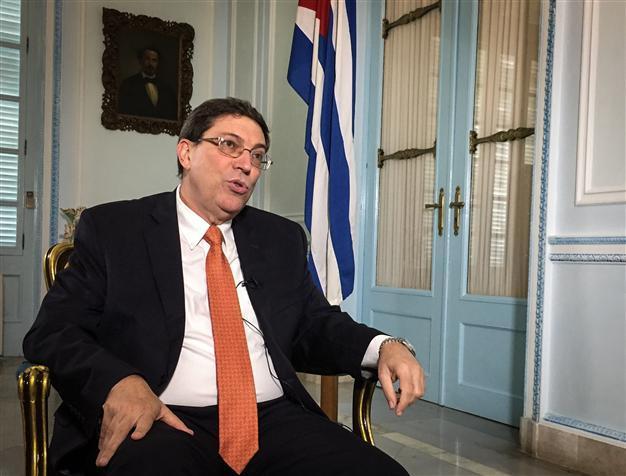US, Cuba to meet in coming weeks on reopening embassies: Minister
HAVANA - Agence France-Presse

Cuban Foreign Minister Bruno Rodriguez speaks during an exclusive interview with AFP on May 13, 2015 in Havana. AFP Photo
The United States and Cuba will hold another meeting in the coming weeks in Washington on reopening embassies, the latest step in their historic rapprochement, Havana's Foreign Minister Bruno Rodriguez said May 13.
"In the coming weeks, there will be a new round of negotiations in Washington on reestablishing diplomatic relations and opening embassies," he told AFP in an exclusive interview.
The exact date has not yet been set, he said.
The two sides have held several rounds of talks since the landmark announcement by US President Barack Obama and Cuba's Raul Castro on December 17 that the former Cold War foes would restore full diplomatic ties severed in 1961.
The negotiations are being led by US Assistant Secretary of State for Western Hemisphere Affairs Roberta Jacobson and Cuba's top diplomat for US affairs, Josefina Vidal.
In Washington, a State Department official said "we expect to meet next week," adding no date has yet been set.
Rodriguez said the talks had made "considerable" progress on the issue of allowing the Cuban diplomatic mission in Washington to open a bank account, which it has not been able to do because of the trade and financial embargo the US has imposed on the communist island since 1962.
The last talks between the two sides took place on March 16 in Havana.
It was followed in April by a highly symbolic meeting between Obama and Castro at the Summit of the Americas in Panama.
Obama then notified Congress of his intention to take Cuba off the black list of state sponsors of terrorism, a key sticking point in the negotiations.
Removal from the black list will enable Cuba to access badly needed financing from the International Monetary Fund and World Bank.
On May 11 the United States left open the possibility that Obama might visit Cuba next year.
Castro said May 12 the talks were "going well," and that the countries could exchange ambassadors once Cuba is removed from the black list.
That is set to take place after May 29, the expiration date of a 45-day period for Congress to oppose the move.
Obama's Republican opponents have until then to pass a joint resolution against it in both houses of Congress, but would likely struggle to muster the votes needed to override a presidential veto.
Castro added however that while exchanging ambassadors is one thing, fully normalizing relations is another altogether.
For that to happen, the trade embargo has to be lifted and the military base that the United States maintains in Guantanamo Bay has to be returned to Cuba, Castro said May 12.
On another issue, foreign minister Rodriguez said France -- whose President Francois Hollande visited the island this week -- has played a leading role in trying to improve relations between Cuba and the European Union.
These ties have stumbled in recent years over EU concerns about Cuba's record on human rights, including its treatment of political dissidents.
The two sides are negotiating an accord to boost political dialogue and cooperation by the end of this year, and Rodriguez said in the interview he saw this timeframe as feasible.
